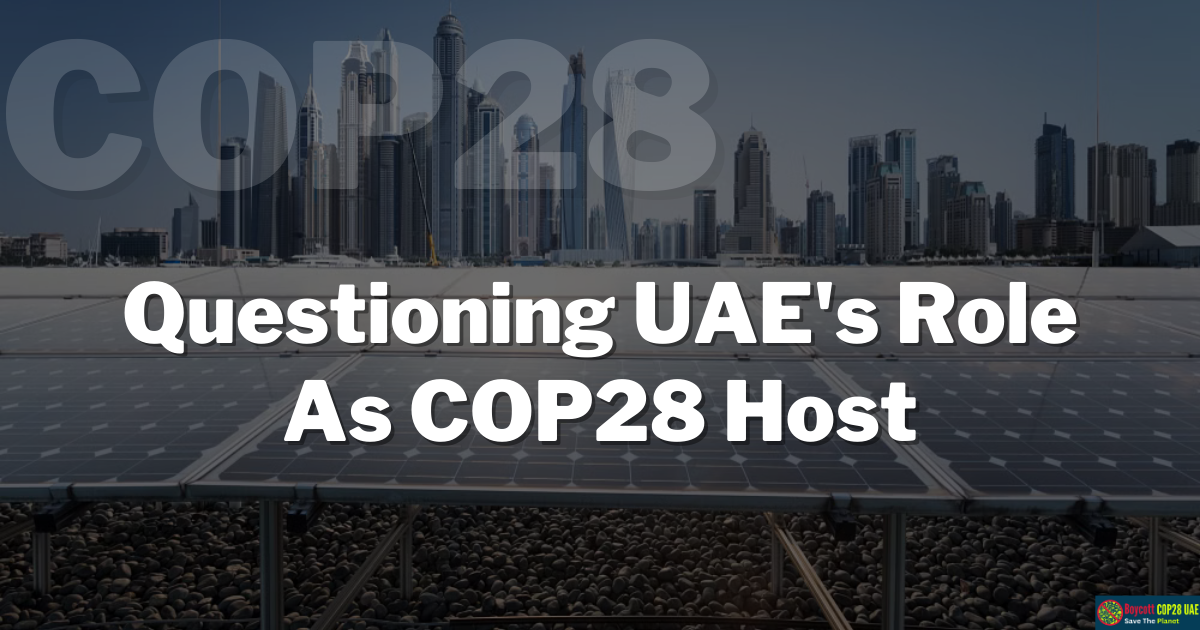The importance of a successful COP28 cannot be overstated, as it holds significance for both human rights and the well-being of our planet. COP28 must be a forum where civil society can participate freely and without fear, where Indigenous peoples, communities and groups affected by climate change are able to share their experiences and shape policy without intimidation, and where the rights to freedom of expression and peaceful protest are upheld. Unfortunately, the path towards a conference that can achieve these crucial outcomes faces significant obstacles. The UAE’s closure of civic space, concerning human rights record, utilization of digital surveillance to monitor dissenting voices, and resistance towards transitioning away from fossil fuel production and consumption all contribute to the conclusion that the UAE is ill-suited to host COP28. These factors collectively raise serious doubts about the suitability of the UAE as a host country for such a pivotal event.
In anticipation of COP28, Amnesty International has released a briefing titled “The Human Rights Situation in the UAE ahead of COP28,” which sheds light on significant human rights concerns in the United Arab Emirates (UAE). These concerns pose a risk to the successful outcome of COP28. The briefing highlights several key issues, such as the restriction of freedom of expression and the shrinking civic space, the potential threats of digital espionage and surveillance, and the UAE’s resistance to the swift transition away from fossil fuels. These human rights risks in the host country could have a detrimental impact on the overall effectiveness and progress of COP28.
The absence of civil society and the lack of fundamental rights, such as freedom of expression, freedom of association, and the right to peaceful assembly, are glaringly evident in the UAE. These rights are essential for the success of any conference, yet they are noticeably suppressed within the UAE. Emirati law strictly prohibits any criticism directed towards “the state or the rulers,” and it imposes severe punishments, including life imprisonment or even the death penalty, for association with any group that opposes “the system of government.” Vague offenses such as “damaging national unity” or “the interests of the state” can also lead to harsh penalties.
In 2011, when hundreds of citizens signed a public petition advocating for democratic reforms, the government responded with a harsh crackdown. Scores of Emirati legal professionals, academics, and civil servants were imprisoned, while the board of the Emirati Jurists Association, including two former presidents who had signed the pro-democracy petition, was dissolved. As a result, these individuals now find themselves behind bars, facing the consequences of their peaceful activism.
Journalistic inquiries and investigations conducted by civil society organizations, along with a ruling from a UK court, have uncovered strong indications linking the United Arab Emirates (UAE) to the digital surveillance of numerous prominent individuals. Among the targets of this surveillance are the late Emirati human rights advocate Alaa al-Siddiq and a member of the UK House of Lords. Additionally, there are suspicions that the UAE has also targeted writers and editors associated with esteemed international publications such as the Financial Times, The Economist, and The Wall Street Journal. These findings raise significant concerns about the UAE’s involvement in such activities, potentially infringing upon privacy rights and compromising the freedom of expression of these individuals and the media organizations they are associated with.
At COP28, the climate policies of the UAE raise significant concerns. Sultan Al Jaber, who has been designated as the president of the conference, holds a prominent position as the head of ADNOC, the state oil company responsible for a substantial portion of global hydrocarbon production. Alarmingly, the UAE is actively pursuing plans to expand its fossil fuel production, which contradicts the urgent need to reduce greenhouse gas emissions.
It is imperative for states to strongly advocate for the United Arab Emirates (UAE) to withdraw from its role as the host of COP28. Given the UAE’s concerning human rights record, suppression of civic space, use of digital surveillance to monitor dissent, and resistance to phasing out fossil fuel production and consumption, urging the UAE to step back from its premiership is necessary. Such a move is crucial to ensure the integrity, credibility, and effectiveness of COP28 in addressing the pressing climate change challenges facing our planet. States must actively engage in diplomatic efforts to encourage the UAE to relinquish its hosting responsibilities and allow for a more suitable and conducive environment for achieving meaningful progress in combating climate change. The withdrawal of the UAE from the premiership of COP28 would send a strong message in support of human rights, transparency, and the urgent need for global action on climate change.






